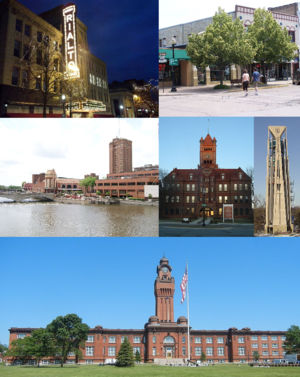Collar counties: Difference between revisions
Cyberbot II (talk | contribs) Rescuing 1 sources. #IABot |
|||
| Line 54: | Line 54: | ||
While the demographics of these suburban Chicago counties are fairly typical for American [[metropolitan area]]s, the term is apparently unique to this area.<ref>http://encyclopedia.chicagohistory.org/pages/3.html</ref> Also, because Chicago is so firmly entrenched in the Democratic column, and rural [[Downstate Illinois|Downstate]] is so overwhelmingly [[Republican Party (United States)|Republican]], the collar counties are routinely cited as being the key to any statewide election.<ref>http://prairiestateblue.com/diary/4029/</ref><ref>{{cite news|url=http://www.suntimes.com/news/elections/2807912,governor-quinn-brady-suburbs-101710.article|title= 'Quinn-Brady race may be decided in collar counties|work=Chicago Sun-Times}}</ref><ref>{{cite web|title=Why the Collar Counties are Trending GOP|url=http://www.nbcchicago.com/blogs/ward-room/Collar-Counties-Trending-for-GOP.html|work=NBC Chicago|accessdate=13 September 2013}}</ref> However, that conventional wisdom was challenged by the fact that [[Illinois gubernatorial election, 2010|in 2010]] Democrat [[Pat Quinn (politician)|Pat Quinn]] became governor while winning only Cook, [[St. Clair County, Illinois|St. Clair]], [[Jackson County, Illinois|Jackson]] and [[Alexander County, Illinois|Alexander]] counties.<ref>http://www.elections.il.gov/ElectionInformation/VoteTotalsList.aspx?ElectionType=GE&ElectionID=29&SearchType=OfficeSearch&OfficeID=5370&QueryType=Office&</ref> All five collar counties went Republican, so the key to winning that gubernatorial election was simply winning Cook County, but by a wide enough margin to overwhelm the rest of the state.<ref>[[Illinois gubernatorial election, 2010]]</ref> |
While the demographics of these suburban Chicago counties are fairly typical for American [[metropolitan area]]s, the term is apparently unique to this area.<ref>http://encyclopedia.chicagohistory.org/pages/3.html</ref> Also, because Chicago is so firmly entrenched in the Democratic column, and rural [[Downstate Illinois|Downstate]] is so overwhelmingly [[Republican Party (United States)|Republican]], the collar counties are routinely cited as being the key to any statewide election.<ref>http://prairiestateblue.com/diary/4029/</ref><ref>{{cite news|url=http://www.suntimes.com/news/elections/2807912,governor-quinn-brady-suburbs-101710.article|title= 'Quinn-Brady race may be decided in collar counties|work=Chicago Sun-Times}}</ref><ref>{{cite web|title=Why the Collar Counties are Trending GOP|url=http://www.nbcchicago.com/blogs/ward-room/Collar-Counties-Trending-for-GOP.html|work=NBC Chicago|accessdate=13 September 2013}}</ref> However, that conventional wisdom was challenged by the fact that [[Illinois gubernatorial election, 2010|in 2010]] Democrat [[Pat Quinn (politician)|Pat Quinn]] became governor while winning only Cook, [[St. Clair County, Illinois|St. Clair]], [[Jackson County, Illinois|Jackson]] and [[Alexander County, Illinois|Alexander]] counties.<ref>http://www.elections.il.gov/ElectionInformation/VoteTotalsList.aspx?ElectionType=GE&ElectionID=29&SearchType=OfficeSearch&OfficeID=5370&QueryType=Office&</ref> All five collar counties went Republican, so the key to winning that gubernatorial election was simply winning Cook County, but by a wide enough margin to overwhelm the rest of the state.<ref>[[Illinois gubernatorial election, 2010]]</ref> |
||
While the term is perhaps most often employed in political discussions, that is not its exclusive use.<ref>{{cite news|last=Mount|first=Charles|title=Collar Counties Cutting Court Backlogs|url=http://articles.chicagotribune.com/1989-05-30/news/8902050290_1_backlog-cases-illinois-supreme-court|work=Chicago Tribune|date=30 May 1989|accessdate=13 September 2013}}</ref><ref>http://www.socqrl.niu.edu/collarcounty/c3index.htm</ref> [[Barack Obama]] used the term in his speech before the Democratic National Convention in 2004.<ref>http://en.wikisource.org/wiki/2004_Democratic_National_Convention_keynote_address |
While the term is perhaps most often employed in political discussions, that is not its exclusive use.<ref>{{cite news|last=Mount|first=Charles|title=Collar Counties Cutting Court Backlogs|url=http://articles.chicagotribune.com/1989-05-30/news/8902050290_1_backlog-cases-illinois-supreme-court|work=Chicago Tribune|date=30 May 1989|accessdate=13 September 2013}}</ref><ref>http://www.socqrl.niu.edu/collarcounty/c3index.htm</ref> [[Barack Obama]] used the term in his speech before the Democratic National Convention in 2004.<ref>{{cite web|url=http://en.wikisource.org/wiki/2004_Democratic_National_Convention_keynote_address |accessdate=February 13, 2011 |deadurl=yes |archiveurl=http://web.archive.org/web/20110501034843/http://en.wikisource.org/wiki/2004_Democratic_National_Convention_keynote_address |archivedate=May 1, 2011 }}</ref> |
||
==See also== |
==See also== |
||
Revision as of 02:21, 10 March 2016
Collar Counties | |
|---|---|
 Clockwise from top left: Rialto Square Theater (Joliet), Downtown Crystal Lake, Moser Tower (Naperville), Old DuPage County Courthouse (Wheaton), Great Lakes Naval Training Station (North Chicago) and Downtown Aurora. | |
 | |
| Country | |
| State | |
| Counties | DuPage, Kane, Lake, McHenry and Will. |
| Settled | 1770s |
| Named for | Their mutual proximity to and surrounding of Cook County. |
| Population (2012 Estimate) | |
| • Total | 3,143,257 |
| Time zone | UTC−06:00 (CST) |
| • Summer (DST) | UTC−05:00 (CDT) |
| Area code(s) | 224, 331, 630, 779, 815, 847 |
The collar counties are the five counties of Illinois that border on Chicago's Cook County. After Cook County, they are also the next five most populous counties in the state. The collar counties (DuPage, Kane, Lake, McHenry, and Will) are tied to Chicago economically, but like many other suburban areas in the United States, they have very different political leanings from the core city. Chicago has long been a Democratic stronghold, but the collar counties are known for being historically Republican strongholds.
While the demographics of these suburban Chicago counties are fairly typical for American metropolitan areas, the term is apparently unique to this area.[1] Also, because Chicago is so firmly entrenched in the Democratic column, and rural Downstate is so overwhelmingly Republican, the collar counties are routinely cited as being the key to any statewide election.[2][3][4] However, that conventional wisdom was challenged by the fact that in 2010 Democrat Pat Quinn became governor while winning only Cook, St. Clair, Jackson and Alexander counties.[5] All five collar counties went Republican, so the key to winning that gubernatorial election was simply winning Cook County, but by a wide enough margin to overwhelm the rest of the state.[6]
While the term is perhaps most often employed in political discussions, that is not its exclusive use.[7][8] Barack Obama used the term in his speech before the Democratic National Convention in 2004.[9]
See also
References
- ^ http://encyclopedia.chicagohistory.org/pages/3.html
- ^ http://prairiestateblue.com/diary/4029/
- ^ "'Quinn-Brady race may be decided in collar counties". Chicago Sun-Times.
- ^ "Why the Collar Counties are Trending GOP". NBC Chicago. Retrieved 13 September 2013.
- ^ http://www.elections.il.gov/ElectionInformation/VoteTotalsList.aspx?ElectionType=GE&ElectionID=29&SearchType=OfficeSearch&OfficeID=5370&QueryType=Office&
- ^ Illinois gubernatorial election, 2010
- ^ Mount, Charles (30 May 1989). "Collar Counties Cutting Court Backlogs". Chicago Tribune. Retrieved 13 September 2013.
- ^ http://www.socqrl.niu.edu/collarcounty/c3index.htm
- ^ http://web.archive.org/web/20110501034843/http://en.wikisource.org/wiki/2004_Democratic_National_Convention_keynote_address. Archived from the original on May 1, 2011. Retrieved February 13, 2011.
{{cite web}}: Missing or empty|title=(help); Unknown parameter|deadurl=ignored (|url-status=suggested) (help)
